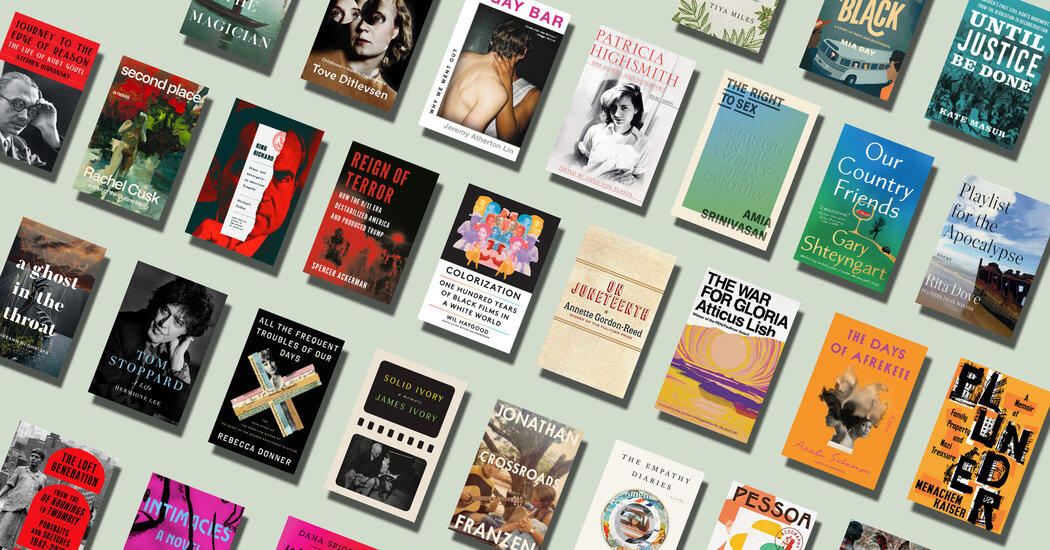
THE LOFT GENERATION: From the de Koonings to Twombly: Portraits and Sketches 1942-2011, by Edith Schloss. Edited by Mary Venturini. (Farrar, Straus & Giroux.) The German American writer and artist Edith Schloss’s memoir was discovered in rough-draft form after her death in 2011, and it’s been polished into a glowing jewel of a book. It recalls a Who’s Who of art-world characters, including Willem and Elaine de Kooning, Leo Castelli and Merce Cunningham. “All five senses are shaken awake” by the book, Jacobs wrote. “If nostalgia is a sixth and often fogging sense, it is absent in a book that feels manifestly present, clear and alive even while describing the past.”
THE RIGHT TO SEX: Feminism in the Twenty-First Century, by Amia Srinivasan. (Farrar, Straus & Giroux.) In these rigorous essays, Amia Srinivasan wants nothing less, she writes, than “to remake the political critique of sex for the 21st century.” This is fraught terrain, and she treads it with determination and skill, writing about pornography and the internet, misogyny and violence, capitalism and incarceration. She also makes space for ambivalence, idiosyncrasy, autonomy and choice. “Srinivasan has written a compassionate book. She has also written a challenging one,” Szalai said. “She coaxes our imaginations out of the well-worn grooves of the existing order.”
THE EMPATHY DIARIES: A Memoir, by Sherry Turkle. (Penguin Press.) In this warm, intimate memoir, the clinical psychologist Sherry Turkle writes about her childhood in postwar Brooklyn; Radcliffe and Harvard in the late 1960s, when she was an undergraduate; and Paris in the early 1970s, where she studied the work of (and got to know) the psychoanalyst Jacques Lacan. This is “a beautiful book,” Garner wrote. “It has gravity and grace; it’s as inexorable as a fable; it drills down into the things that make a life.”
PESSOA: A Biography, by Richard Zenith. (Liveright.) Fernando Pessoa, the Portuguese poet, critic, translator, mystic and giant of modernism, published a few books that went mostly unnoticed during his lifetime. After his death in 1935, a trunk was discovered, brimming with his true life’s work, written not only by Pessoa but by a flock of his personas (he created dozens of them, including a doctor, a classicist, a bisexual poet, a monk, a lovesick teenage girl). Zenith’s book is “mammoth, definitive and sublime,” Sehgal wrote. He has “written the only kind of biography of Pessoa truly permissible, an account of a life that plucks at the very borders and burdens of the notion of a self.”
Fiction & Poetry
SECOND PLACE, by Rachel Cusk. (Farrar, Straus & Giroux.) Rachel Cusk’s first novel since she concluded her acclaimed Outline trilogy is about M, a sharply observant middle-age writer who lives with her second husband on a remote piece of property. She invites L, a famous younger painter whose work she admires, to come and stay in their “second place,” a cabin that’s an artist’s retreat of sorts. L arrives with a beautiful young girlfriend in tow, and the novel becomes a swirling hothouse. “It’s as if Cusk has been reading Joyce Carol Oates’s best novels,” Garner wrote. “She digs into the gothic core of family and romantic entanglements.”
PLAYLIST FOR THE APOCALYPSE: Poems, by Rita Dove. (Norton.) Rita Dove’s new collection is about the weight of American history, and it’s also about mortality. It’s the first time she has publicly acknowledged that she has had a form of multiple sclerosis for more than 20 years. Some of these poems address health troubles. Some are about Martin Luther King Jr., Robert F. Kennedy, Muhammad Ali and Barack Obama. Garner called the poems “among her best,” and wrote: “Dove’s books derive their force from how she so deftly stirs the everyday — insomnia, TV movies, Stilton cheese, rattling containers of pills — into her world of ideas and intellection, in poems that are by turns delicate, witty and audacious.”
CROSSROADS, by Jonathan Franzen. (Farrar, Straus & Giroux.) Jonathan Franzen’s new novel, which starts a trilogy, is set in suburban Chicago. At its center are the Hildebrandts, another of the author’s seemingly solid Midwestern families. The patriarch, Russ Hildebrandt, is the local church’s idealistic associate pastor. Throughout the novel each of the major characters suffer crises of faith and of morality. “It’s a mellow, marzipan-hued ’70s-era heartbreaker,” Garner wrote. It’s “warmer than anything he’s yet written, wider in its human sympathies, weightier of image and intellect. If I missed some of the acid of his earlier novels, well, this one has powerful compensations.”



